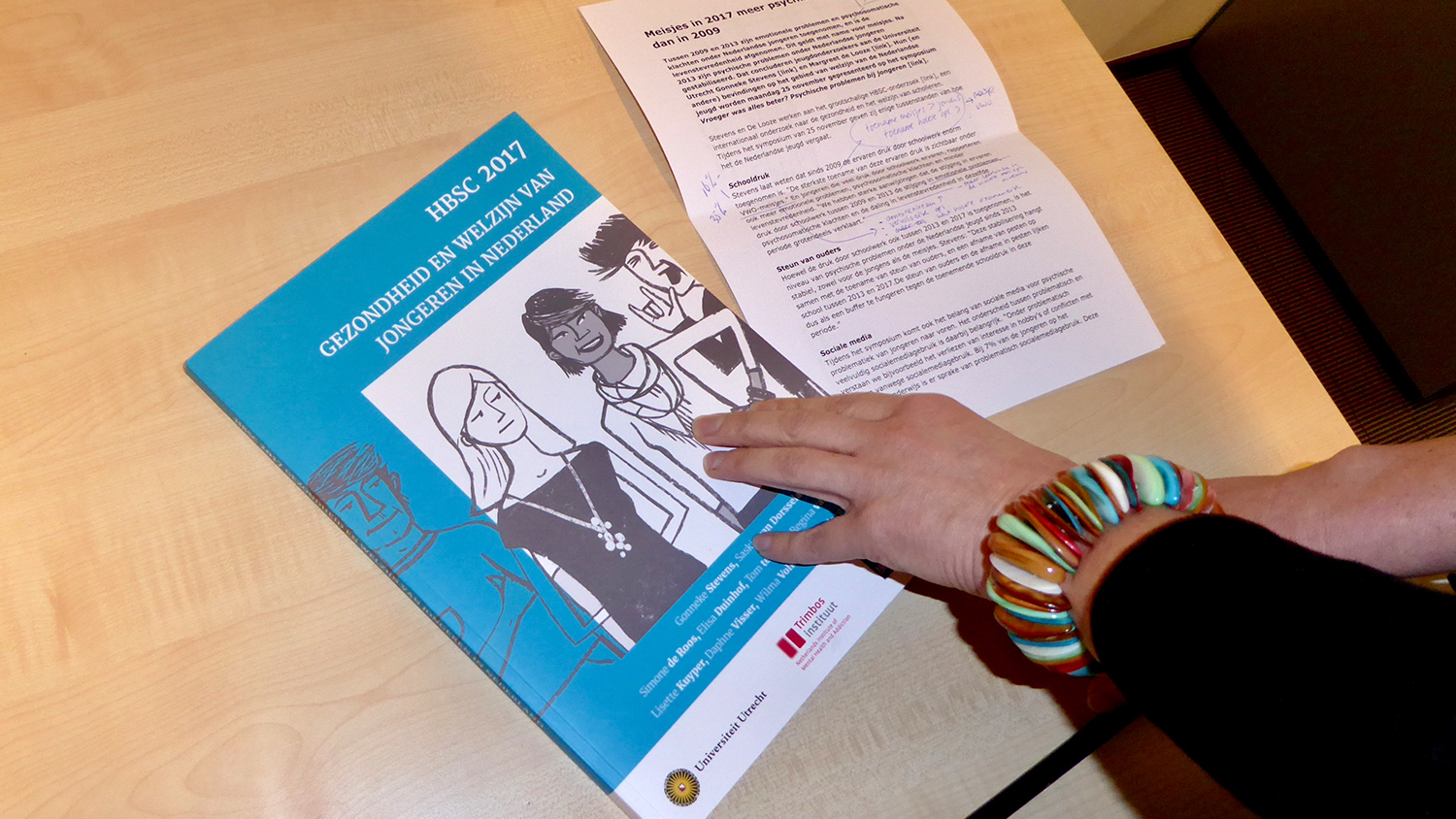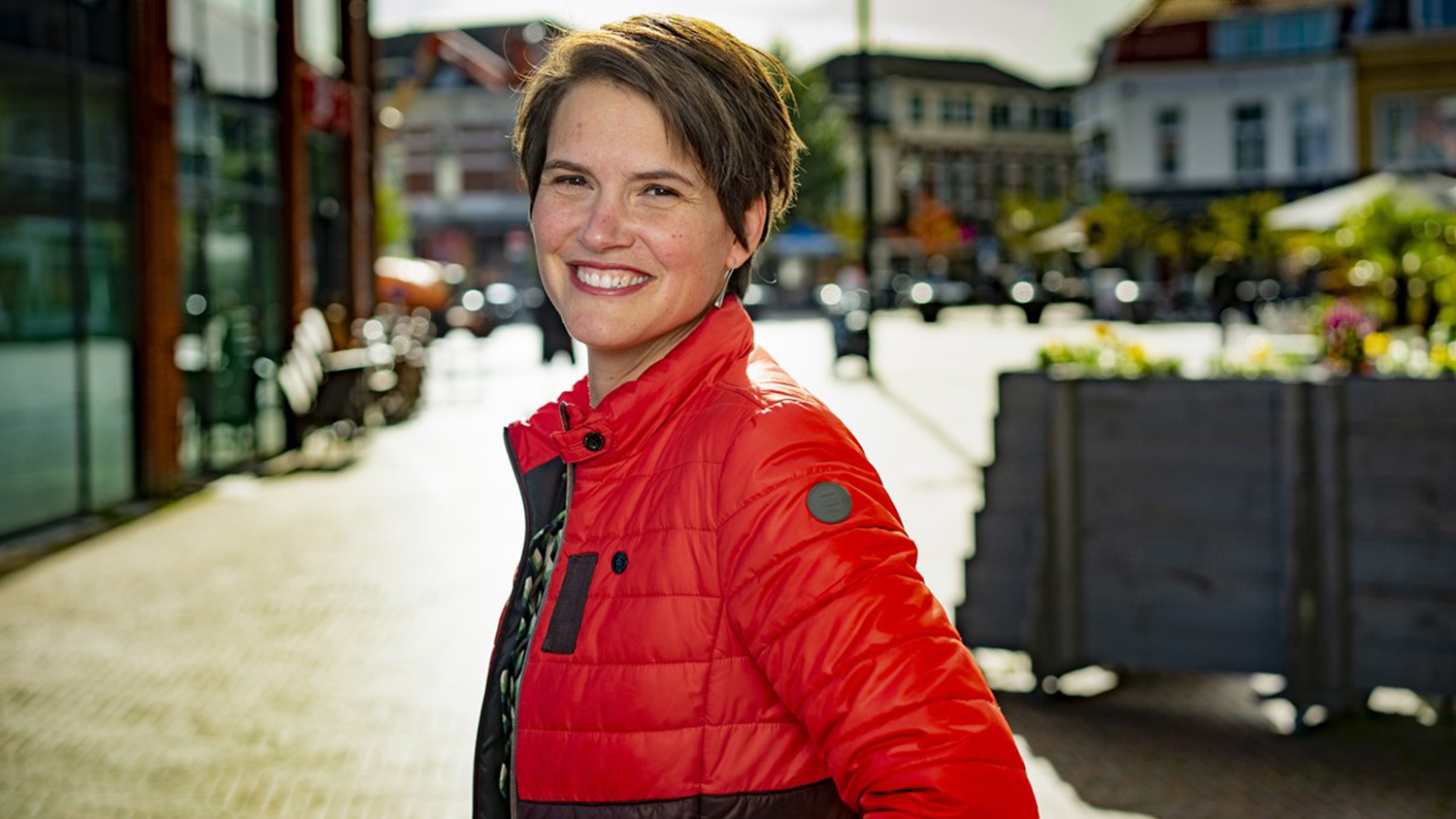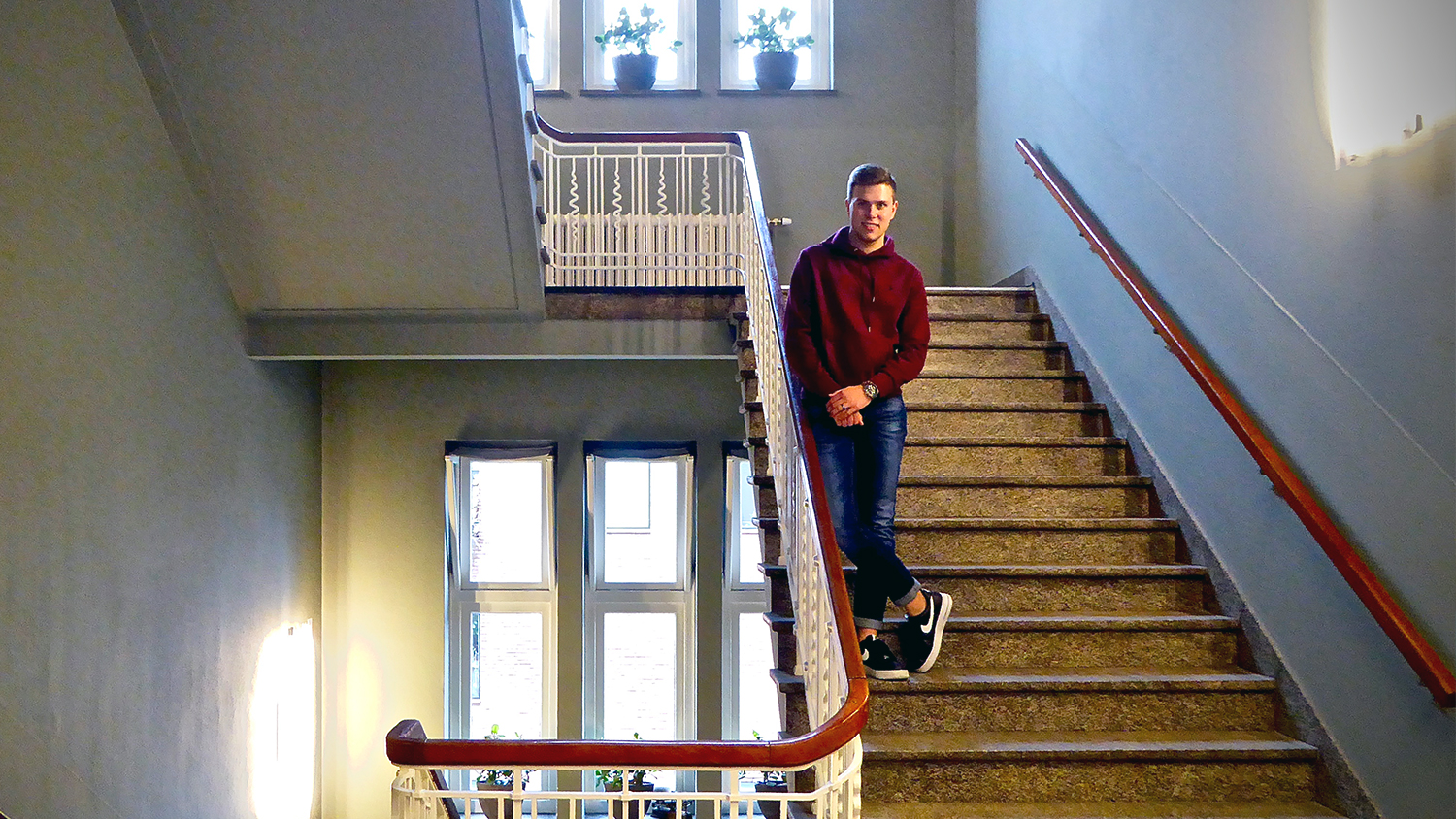High schoolers bring stress with them to college

Dalila Abdelkhalek is 21 years old and a student of Medicine. “Sometimes, I’m so stressed that I can’t function at all anymore; I have to go to sleep in order to make my brain function again,” the first-year student says. She’d done high school levels mavo, havo, and vwo n Amsterdam, but not necessarily with the goal of studying medicine. “Everyone told me I wouldn’t be able to graduate from havo and vwo. I wanted to prove that I could do it, and that causes a lot of pressure.”

Youths’ wellbeing is studied every four years in the HBSC (Health Behaviour in School-aged Children), which Gonneke Stevens and Margreet de Looze work on. For the study, 7,000 secondary school pupils filled out questionnaires. The previous study dates from 2017.
“The most remarkable result is that between 2009 and 2017, the pressure from schoolwork has increased a lot. 42 percent of girls now experience pressure from schoolwork; in 2009, this was 24 percent,” says Stevens, UU teacher of General Social Sciences. In boys, the pressure percentage rose from 17 to 29 in eight years’ time.
But is this similar to the situation at university? Liberal Arts & Sciences student Itah Scholten (20) feels like the stress has relieved somewhat since she’s started at university. “In secondary school, I hung out with other girls who were also achievers, the medicine girls,” Scholten says. She also experienced pressure from her father’s wishes. “He wanted the best for me, and in his eyes, that means doing your best and getting really good grades. That, among other things, made me adopt those same values.” The stress caused her to experience stomach aches, and those only passed when an exam was over. Now she’s a student, she experiences less stress – mainly because now, she’s the only one demanding anything from herself. She’s also learnt to handle the pressure better, because she feels her courses are easier than the ones she took in secondary school.
 Stomach ache
Stomach ache
School pressure is related to mental and psychosomatic issues, according to the HBSC study. “The small increase of emotional problems amongst youngsters between 2009 and 2013 seems to be connected to the increase in pressure because of schoolwork. That’s an important result,” Stevens says. The category of emotional problems encompasses, among other things, fear, gloominess, and nervousness. Psychosomatic complaints include headaches, stomach aches, and sleep disorders. The general level of life satisfaction has also dropped somewhat in the time that the pressure from schoolwork increased.

But that’s not just because young people are busy with their studies. Aside from school, they also experience stress from other factors. Medicine student Abdelkhalek joined student association Veritas this academic year, something she’d “underestimated somewhat”. Last week, for instance, she had to be at the association house until ten pm on a Tuesday, then travel an hour and a half by train, and the next morning, she had early classes again. “Sometimes, I indicate that it’s becoming too much to handle. But that also bums me out: other people seem to be doing just fine, why can’t I?”
Last winter, there was a time she wasn’t doing too well. “I’d been sick a lot, and had failed a block of classes. I received a letter from the study programme that said I had neither a negative nor a positive study advice. That caused a lot of stress.” She started to wonder what she was doing it all for, and felt ‘empty’. “At that time, there was nothing I could’ve done to make me feel better.” To regain control, Abdelkhalek made an appointment with the student psychologist the university offers. Unfortunately, she was told she’d have to wait a month and a half before she could get that appointment. By the time her appointment finally came around, she was ill.
Stricter requirements
Stevens’ research shows that girls experience more pressure from schoolwork than boys, and that the increase in pressure is stronger amongst girls than amongst boys. This is probably due to stricter requirements on the one hand, and on the other because young people are feeling that achieving is increasingly important. Girls worry more about this than boys.

Dr. Gonneke Stevens. Photo: Ivar Pel, UU
As for those requirements: the exam requirements were made stricter in 2011, for example. You’re not allowed to graduate if you have an average failing grade for Dutch, maths, or English. In this same period, universities started a stricter selection process for Bachelor’s programmes. “Medicine, for example, has a strict, intensive selection proves, but I do wonder whether the selection means they find better doctors. I think research into this topic would be very important,” Stevens says. The increased pressure from schoolwork might also be caused by the end of the so-called ‘culture of sixes’, a Dutch term that means ‘mediocre grades are good enough’. Girls, especially, find high achievements increasingly important, Stevens thinks. But do boys experience the same?
Strict selection
18-year-old Luuk Nagtegaal is a student of Governance. He thought the selection process for his study programme was quite tough, even though he’d gained rather a lot of experience for this programme while still in secondary school. He was active for political party VVD, and president of the student council at school. “For the selection process, I had to create an online file, with questionnaires, a personality test, a recommendation from someone from my secondary school, a motivation letter, my CV, and I had to debate a professor at the faculty.” The latter was especially tough. “That professor was sharp and really went for it. He could’ve eased up a bit,” Nagtegaal thinks.

He himself isn’t particularly stressed, even though is schedule is “completely full”. Next to his studies, he’s in a committee for study association Perikles, he’s in the Public Spaces committee of the municipality of IJsselstein for the VVD, he attends the council meetings there, he exercises, and he’s looking for a room in Utrecht. “About five times per block I think: why are there only 24 hours in my day?” Sometimes, it does become too much, which he notices because his concentration wanes. “When I hit that line, I think: okay, I’ll hit the gym for a bit, and go for it again the next day.” Or he’ll smoke a cigarette.
He has noticed differences in stress between the boys and girls of his programme. Recently, he heard a girl say: ‘I had a 6.4 for my exam. I want a re-sit so I can get a better grade; why am I not allowed?’ “I think they’re perfectionists more than the boys are. In my group of friends, it’s more like, great, I got a 5.5, on to the next course.” Nagtegaal’s biggest source of stress are his parents. “I’m the only one in my entire family who’s made it to university. That causes a lot of pressure, because I want to make them proud.”
But in a way, that’s easy for him to say – so far, he’s passed all his exams. “If I had failed something that I’d studied really hard for, I would’ve been disappointed and surprised. What went wrong? I’d think,” Nagtegaal admits.
A little more flexible
Researcher Stevens wonders whether the issue of the stressed youth lies with the young people themselves, or with society. “Perhaps we expect too much of them sometimes,” she says.
The university’s measures to relieve stress are insufficient, say Abdelkhalek, Scholten, and Nagtegaal. Teachers should be a little more flexible with deadlines during busy periods, and there should be more student psychologists. Abdelkhalek would like to see the regulations for medical leave be improved. “You have to submit so much proof when you’re sick.” Instead of recovering, you have to focus on the attendance requirements, and that causes stress. “That could be helped if the university had just a little more faith,” she says.
In the Netherlands, most children attend primary school from age four on. Education is compulsory for children aged five and up. Primary school lasts eight years. In the eighth year, a decision is made about the level of secondary school a child can attend. There are three different levels in secondary school. Most children attend the vmbo level, which is pre-vocational schooling. One level up is havo, which allows graduates to attend a university of applied sciences. The highest level is called vwo, a prerequisite for attending university. The vwo level consists of two different streams: the atheneum and the gymnasium. The level of education is the same in both, but pupils attending gymnasium are also taught Latin and Greek next to the regular courses that atheneum pupils take as well.